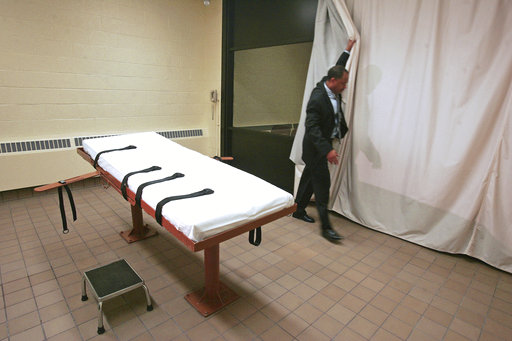California Death Penalty Measure Survives, With Limits
The voter-approved measure to speed up executions was upheld, while justices ruled that a five-year limit on appeals was not mandatory. Kiichiro Sato / AP
Kiichiro Sato / AP
The California Supreme Court on Thursday upheld a voter-approved measure aimed at speeding up executions, The Associated Press reported. However, the court also ruled that a provision putting a five-year limit on appeals by condemned inmates was not mandatory.
In reacting to the ruling, Truthdig contributor, author and former judge Bill Blum sent this comment to the website:
It’s unclear to me when the full impact of this opinion upholding the bulk of Prop 66 will be felt. While the state supreme court ruled that the proposition’s five-year time limit for resolving death-penalty appeals and related post-appeal habeas corpus petitions was “directive” rather than “mandatory,” the court upheld other basic provisions of the proposition that will revamp procedures for both appeals and habeas review to speed up the judicial process. Under the proposition, for example, the job of appointing death-penalty appellate lawyers will be transferred from the state supreme court to the trial courts where the defendant was convicted. Proponents of the proposition apparently believe that local judges will have greater success in finding lawyers for death-row inmates, who will then be placed under strict time deadlines for the filing of briefs. This is a huge shift that could result in the appointment of less qualified lawyers.
California has by far the largest death row population in the country, with 744 condemned inmates. Florida ranks a distant second with 386. Texas comes in third with 247. Unlike Florida and Texas, however, California has historically been very slow to carry out executions, with the last taking place in 2006.
The intent of the proposition is to hasten the road to execution. If the proposition succeeds in doing so to any appreciable degree, given the size of our death row, we could be looking at a bloodbath that would make Florida and Texas envious.
AP quoted from majority and dissenting opinions in the case:
“The time limits reflect the voters’ will, which we respect. However, they were presented to the voters by the proponents of Proposition 66 without the benefit of hearings or research exploring their feasibility or their impact on the rest of the courts’ work. As the concurring opinion explains, these are issues of considerable complexity and difficulty. The implementation of Proposition 66 will necessarily be an ongoing process of exploration and adaptation.”
— Associate Justice Carol Corrigan’s majority opinion
“The bait-and-switch undertaken by the proponents of Proposition 66 — and countenanced by the majority — will do nothing but breed cynicism in the electorate and supply further kindling to those who doubt the efficacy and workability of constitutional democracy. As an inducement to support this initiative, voters were promised that state court review of death penalty judgments could and would be completed within five years. That promise, as the majority concedes, was a sham.”
— Associate Justice Mariano-Florentino Cuellar’s dissenting opinion
AP later posted an update saying capital punishment advocates must get approval for a new lethal injection method before executions can resume. On Friday, corrections officials asked state authorities for regulatory approval of a revised protocol for executions, which would allow condemned inmates to choose between being executed with drugs or in the gas chamber.
The court’s decision could take effect as soon as next month. The next step would be for state officials to seek the lifting of injunctions that have prevented California from executing anyone since 2006.
Dig, Root, GrowThis year, we’re all on shaky ground, and the need for independent journalism has never been greater. A new administration is openly attacking free press — and the stakes couldn’t be higher.
Your support is more than a donation. It helps us dig deeper into hidden truths, root out corruption and misinformation, and grow an informed, resilient community.
Independent journalism like Truthdig doesn't just report the news — it helps cultivate a better future.
Your tax-deductible gift powers fearless reporting and uncompromising analysis. Together, we can protect democracy and expose the stories that must be told.
This spring, stand with our journalists.
Dig. Root. Grow. Cultivate a better future.
Donate today.








You need to be a supporter to comment.
There are currently no responses to this article.
Be the first to respond.